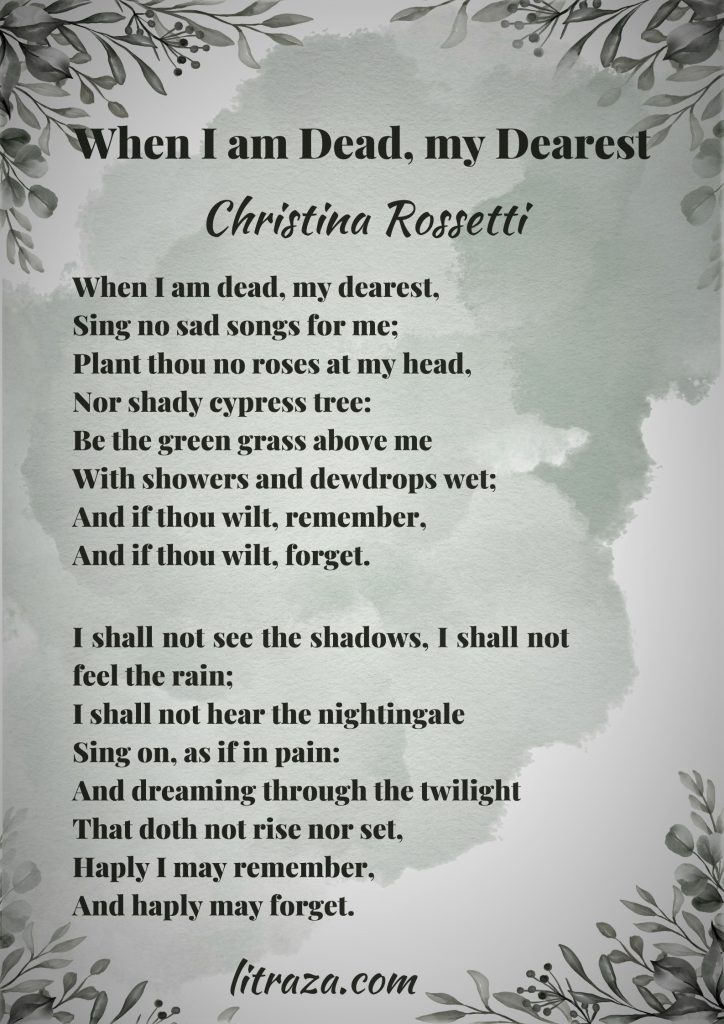Introduction
When I am Dead, my Dearest by Christina Rossetti is a famous song. It is one of Christina Rossetti’s most loved works. The poem is an address to someone with whom the poetess has an intimate association. She instructs that person about how he should behave after her death. This song has something unique about it that attracts us. Christina Rossetti wrote this song when she was a teenager. The readers cannot help admiring such ideas from a teenage girl. When I am Dead, my Dearest by Christina Rossetti is part of the English literature syllabi of various educational institutions. This article, When I am Dead, my Dearest by Christina Rossetti – Summary & Analysis, will assist students in grasping the approach and idea of the song. It will also help instructors as a reference article.
Christina Rossetti
Christina Rossetti, the poetess of the song, When I am Dead, my Dearest, was born on December 5, 1830. She was a leading literary figure of the Victorian age. Rossetti wrote a large number of poems. Her anthologies include Goblin Market and Other Poems, The Prince’s Progress, and A Pageant. Christina Rossetti’s poetry has always remained a topic of discussion. However, since the emergence of the feminist movement, her poetry has begun to receive greater critical interest. Critics with a feminist bent of mind take an interest in Rossetti’s approach to gender issues. Rossetti’s poetry also discusses the themes of dejected love, divine love, sexuality, repression of desire, religion, and death. For her poetry, she received the praise of leading literary figures of the Victorian age. Gerard Manley Hopkins, Virginia Woolf, Philip Larkin, Ford Madox Ford, and Elizabeth Jennings were her admirers. Rossetti passed away on December 29, 1894.
Text of the Poem When I am Dead, my Dearest by Christina Rossetti

Summary of the Poem When I am Dead, my Dearest by Christina Rossetti
Introduction
When I am dead, my Dearest by Christina Rossetti is a beautiful song. The poetess employs the first-person narrative voice. The speaker who is presumably a woman addresses her lover and instructs him how he should respond when she dies. The poem is an acknowledgement of the inevitability of death. But at the same time, it is an expression of Rossetti’s disbelief in the afterlife. The poetess has observed how lovers react after the death of their beloveds. She believes that, after the death of a person, all the gestures of love are futile. Christina Rossetti thinks that death breaks all connections with this world. Therefore, it does not matter what others do in her memory.
Speaker’s Instructions to Her Lover
Christina Rossetti’s speaker begins by asking her lover not to sing any sad song in her memory after her death. She further asks him not to place roses beside her tombstone. Nor should he plant a cypress tree casting its shade on her grave. She says that the grass growing naturally with dew drops on it will be enough for her grave. Moreover, it will be of no importance whether he remembers her or not.
Reason’s for the instructions
In the second stanza of When I am Dead, my Dearest, Christina Rossetti elaborates on the reasons for the instructions to the lover. The speaker believes that death will cut her off from all the activity going on in the world. Neither will she feel the rain nor will she feel the shade of the cypress by her grave. She will not hear the painful song of the nightingale. Instead, she will be in a state of eternal sleep – dreaming in the never-ending twilight. She is not sure whether she will remember her lover or not after her death.
Conclusion
When I am Dead, my Dearest by Christina Rossetti is an excellent piece of poetry. Rossetti has used simple diction and short rhythm which make the poem easily comprehensible. It is also Rossetti’s accomplishment that the reader can read the poem on two different levels. On an apparent level, the poem is an address to a lover. But since the poetess does not mention any specific person, it may be an address to all her kith and kin. This ambiguity adds to the beauty of this song. However, her message is loud and clear. She does not believe in the afterlife. Therefore, she does not want any sentimental fuss over her death.
Analysis of the Poem When I am Dead, my Dearest by Christina Rossetti
A Startling Beginning
When I am Dead, my Dearest by Christina Rossetti is a fascinating song. It begins with a startling phrase: “When I am Dead.” Immediately, it arouses a variety of expectations in the mind of the reader and puts him to guess about the progress of the song. He expects that the poetess will exhibit her feelings of helplessness before death. Maybe, the poetess will express her regret at leaving this world. She may be eager to know how her lover or dear ones will react to her death. But the poetess asks her lover or dear ones not to behave traditionally at her death. She thinks that all expressions of love or gestures of attachment will lose their importance after her death. In her grave, she will not smell the fragrance of roses, feel the shade of cypress, or listen to sad songs in her memory.
Christina Rossetti’s Disbelief in the Afterlife
Christina Rossetti was a dedicated Anglican Christian. She wrote several poems on religious themes. She had a strong faith in God and fervently prayed to Him. In When I am Dead, my Dearest, however, her idea about the afterlife seems opposite to the Christian belief. In the second stanza of the poem, Rossetti continues to express a complete detachment from life on Earth. Neither will she feel the rain nor will she feel the pain. But she does not make any mention of life after death. Nor does she express any desire to wake up in heaven. The only reference we find is of constant sleep in perpetual twilight. It reflects her disbelief in the afterlife. The use of the word ‘Haply’ twice in the last two lines suggests Rossetti’s confusion about the concept of the afterlife.
Conclusion
When I am Dead, my Dearest by Christina Rossetti is a unique song. It is different from other poems or songs on the subject of death. The poetess opines that the end of life is accompanied by an end of desire to be pampered by a lover. The tone of the poem suggests that emotions are for living beings and not for the dead.
Click for an article about the poem The Silken Tent by Robert Frost.




[…] When I am Dead, my Dearest by Christina Rossetti is another unique poem on the subject of death. […]
[…] Excellent notes for preparation of the poem, When I am Dead, my Dearest by Christina Rossetti […]